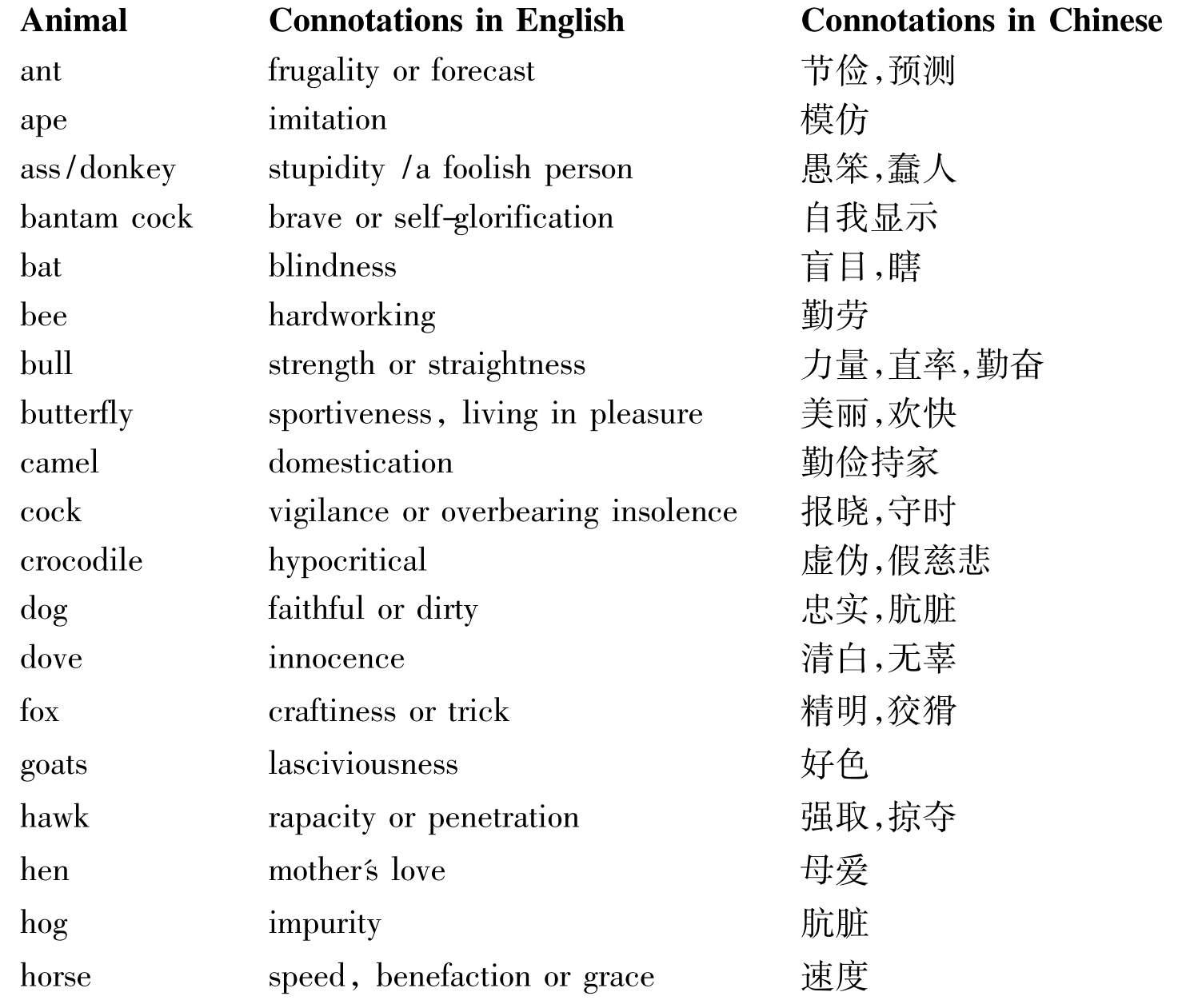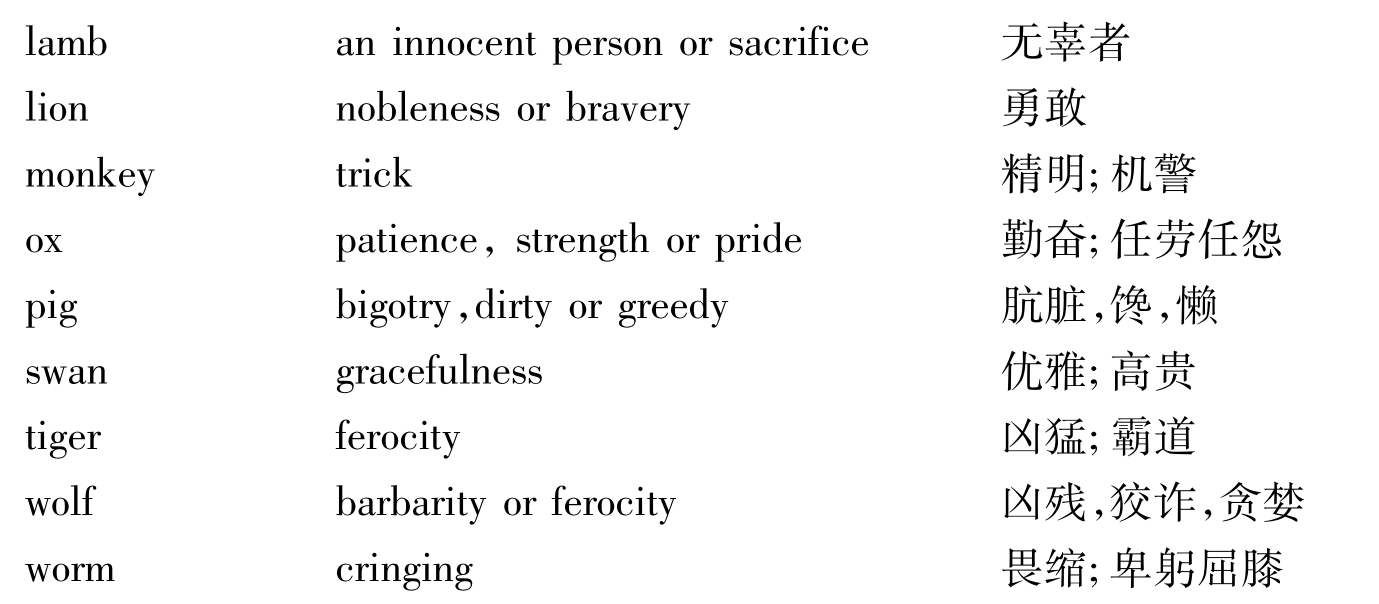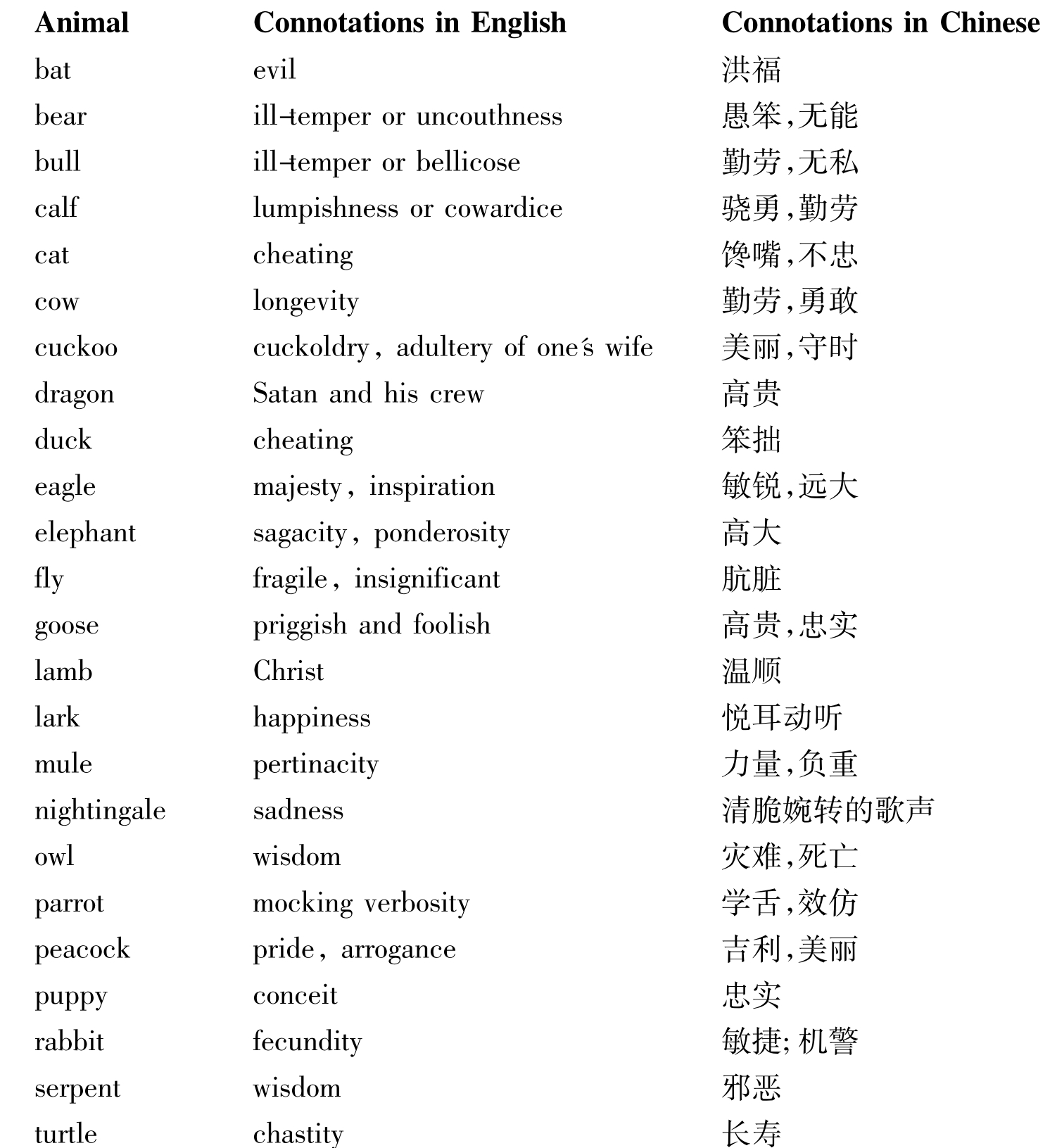4.4.2 Words and Associative Meaning单词与联想意义
4.4.2 Words and Associative Meaning单词与联想意义
For students of a foreign language,it is essential that they know not only the conceptual meaning of words,but also their associative meaning,which is,generally,peripheral in lexical meaning,though.Many English words,since they appeared,have had associative meaning,including connotative,social,affective,reflected,and collocational.If connotations of words,varying from culture to culture,are ignored,serious misunderstandings may occur in cross-cultural communication or translation.The connotations of a great many English words are different from those of their translation equivalents in Chinese.Therefore it is very important for a translator to well know this point.Only a couple of words are mentioned here for example.The word“book”refers to“a number of printed pages fastened together and enclosed in a cover” .This is universally true.But for the Chinese people books contain knowledge and wisdom for people,especially,the youth,to learn,while for English speakers,they express ideas for people to consider,to agree or disagree,and to comment.The word “sexy”means “sexually suggestive or stimulating”or“generally attractive or interesting” .It is a positive term in English.To be sexy is to possess a positive human quality.Mothers want their daughters to be sexy and girls hope to be sexy,too.However,the sex morality in China is different.We all know that,before the door-open policy,the compliment “You are pretty”by a strange male might hurt a Chinese girl.Even though Chinese culture is changing rapidly,the sentence“You are sexy”might not be taken as a compliment in Chinese because性感connotes loose sex morality which is generally rejected in Chinese culture.
4.4.2.1 Colors associated with culture and their translation色彩的文化内含及其翻译
Science research shows that there are more than hundreds of colors in the world.The words and expressions of colors vary from culture to culture and their classifications are quite different.But the basic classifications of colors between China and English-speaking countries are roughly the same.They are red,orange,yellow,green,blue,indigo and violet(赤、橙、黄、绿、青、蓝、紫).Because of physical,mental and psychological reasons,the semantic meaning remains different in different customs,habits,and expressions.Now let us look at the following colors and distinguish their associative meaning between English and Chinese.
“Red” is usually associated with celebrations,happiness,delight and joyful occasions.This is true in both English-speaking countries and China.We usually find antithetical couplets written on scrolls in red on both sides of doors during the Spring Festival in China,the brides often wear red clothes in weddings,and when people meet their animal years every twelve years,they frequently wear red belts and red underwear so as to be lucky and dispel misfortunes.Similarly Westerners also like the “red”color,which is still associated with the same pleasant meaning as Chinese do.They regard Christmas and other holidays as“red-letter days” (纪念日,吉日).When they invite the summit leaders of other nations,they use“the red carpet” (隆重的欢迎)in the airport as the most courteous reception.
The word“red” ,however,sometimes may give us a kind of unpleasant feeling when reading.
 a red battle一场血战 red hands沾满鲜血的双手
a red battle一场血战 red hands沾满鲜血的双手
red tape繁文缛节 red herring让人分心的东西
red-light district红灯区 red ink赤字
in the red亏本 paint the town red狂欢,痛饮
Meanwhile,the“red”color can symbolize health and emotion in both English and Chinese.
 A fine old man came to me,with a face asred as a rose.
A fine old man came to me,with a face asred as a rose.
一位红光满面,精神矍铄的老人朝我走来。
 The maxim was that when a married couple sawred lawyers saw green.
The maxim was that when a married couple sawred lawyers saw green.
俗话说,夫妇吵得面红耳赤之时,便是律师招财进宝之日。
Comments The word“red”in the first sentence implies being healthy and the“red”in the second represents a sort of emotion.Here we should pay more attention to the second meaning.English words “see red”expresses the meaning of getting extremely angry or losing one's temper.It is quite different from Chinese Characters见红,which suggests the bleeding before childbirth or in the first sexual intercourse.
In addition,红in ancient China represents beauty.红颜,红粉,红闺,红楼are cited as some examples.红颜in Chinese means“a beautiful girl”or“a pretty face” ,红粉can be rendered into“a gaily dressed girl” .红闺may be translated into“a lady's room” .红楼is“a boudoir” .
“Green” has different associative meanings between English and Chinese.In English,it is often used to express “envy and jealousy” .For this reason,we can find such phrases as“green with envy” (眼红),“green as jealousy” (妒忌)and“the greeneyed monster” (害了红眼病)in English.
 Alice's girl friends were green with envy when they saw her new dress.
Alice's girl friends were green with envy when they saw her new dress.
爱丽丝的女友看到她的新衣时,心里充满了妒忌。
Comments In Chinese,however this concept is expressed as红眼,which is really opposite to the English meaning.If we translate it into“red-eyed” ,we indeed make a big mistake.
Sometimes“green”is used to express “an inexperienced or untrained person”or“something undeveloped or gullible” .
 Smith is a boy who is still green at his job.
Smith is a boy who is still green at his job.
史密斯是一个对其工作尚无经验的青年。
 “My eyes,how green!”exclaimed the young gentleman.(C.Dickens: Oliver Twist)
“My eyes,how green!”exclaimed the young gentleman.(C.Dickens: Oliver Twist)
“啊唷,多么幼稚!”小绅士喊道。
By comparison,the Chinese character绿is extended to imply that someone's wife has adultery or illicit intercourse with other male,whose expression is戴绿帽子.If we translate it into“to wear a green hat” ,native English-speakers may misunderstand it as头戴一顶绿色的帽子.Actually the Chinese express戴绿帽子should be translated into“to be a cuckold”in English instead.
“Green”is sometimes associated with paper money or currency(纸币)as in the phrase“long or folding green” .
黄in Chinese is used to denote something pornographic,filthy,vulgar,trashy,old or obscene.So there appear some expressions like黄色电影,黄色书刊,黄色音乐,黄色软件in Chinese.Their English versions should be “obscene films” ,“filthy publications” ,“vulgar music” ,and “trashy software”respectively.Instead in English the word“blue”is used to express such concepts whereas the English word“yellow”has nothing to do with these concepts.We can find expressions in English like“yellow pages”(黄页电话簿)which refer to the phone directory,and“the yellow press” (耸人听闻的报纸)which refers to the newspapers which present news in a sensational way.“Yellow boy” (金币)refers to gold coin.Sometimes the associative meaning of “yellow”is“cowardly or timid” .For instance ,“He is too yellow to stand up and fight.”is translated into他太软弱,不敢起来斗争.
But we should know that黄was treated as the highest position in ancient China.For one thing,it is pronounced the same as皇,which stands for an emperor and everything related to him.And for another,黄presents harvest in autumn because everything turns yellow at that time.
“Blue”is used to present“tranquility”and“the color of the clear sky in late fall or of the deep sea on a fine day”both in English and Chinese.However,the associative meanings of this word in English are more than in Chinese.In English,it is figuratively used to imply“sadness and hopelessness”as in the phrases“in a blue mood” ,and“to have the blues” .
 “You look blue today.What's the matter with you?”
“You look blue today.What's the matter with you?”
“She is in holiday blue.”
“你今天显得闷闷不乐,出了什么事情?”
“她得了假期忧郁症。”
Comments In the short dialogue above,the first“blue”means“sad” ,the other is a phrase equal to“winter holiday depression” ,which refers to the sad and lonely mood before the Christmas.
In addition,the word “blue”in English is applied to denote “pornographic,or vulgar” .The phase“a blue film”is translated into黄色电影,and the Chinese version of“to make a blue joke”is讲黄段子or开下流玩笑.
 By one survey,more than 20 million Americans now watch at least one blue video each week.
By one survey,more than 20 million Americans now watch at least one blue video each week.
据一项调查显示,现在美国有两千多万人每周至少观看一部黄色录像片。
“White” ,whose associative meaning is very similar in both English and Chinese,figuratively connotes“purity or innocence” .That is why the brides are dressed in white in western countries.However ,“white”in some English phrases does not denote白in Chinese.
 a white lie善意的谎言 the white coffee牛奶咖啡
a white lie善意的谎言 the white coffee牛奶咖啡
white collar脑力劳动者 white elephant大而无用的东西
white feather丧失斗志,胆怯 white hope令人寄以厚望的人
white magic善意的法术 white slavery拐卖妇女的行业
white wash掩饰,粉饰
The colour“black”symbolizes“death,hardship and sorrow”both in English and Chinese.Therefore,English-speaking people usually wear black clothes or garments when attending a funeral.The Chinese people also wear weeds when mourning over the death of someone.So“black tidings”should be translated into噩耗or不幸的销息.The version of“the Black Friday”is凶险不祥的日子.Further examples in English may include“blacklist” (黑名单),“black market” (黑市),“a black-letter day” (倒霉的一天).
The“black”color is also associated with“anger or rage”in English.For instance,“black in the face”and“to look black at somebody”can be respectively translated into脸色铁青and怒目而视.
 I got some black looks from the shopkeeper when I can celled my order.
I got some black looks from the shopkeeper when I can celled my order.
当我撤销订单时,店老板对我怒目而视。
 The slightest order was received with a black look,and grudgingly and carelessly obeyed.(R.L.Stevenson: Treasure Island)
The slightest order was received with a black look,and grudgingly and carelessly obeyed.(R.L.Stevenson: Treasure Island)
就是让他们做一点小事,那些人也会怒目而视,干起活来也是勉勉强强,马马虎虎。
Sometimes ,“black”symbolizes “evil”as in “black-hearted”(坏心肠)and“blackguard” (恶棍).It sometimes implies“very sad feelings,behaviors,news etc.”For example ,“The bad news we've been getting means that things look black for us.”can be translated into我们得到的这些坏消息意味着情况很不乐观.
4.4. 2. 2 Animal and plant words and their translation动植物名称及其翻译
Languages of all nations contain a lot of words denoting animals and plants,and so are English and Chinese.However,because of different cultures,different environments,different histories,different customs,etc.,animals and plants have been given different meanings in different languages.So some animal and plant phenomena in translation should be paid special attention to,so as to make our translations more accurate and more excellent.
Animals and plants are our neighbors,and companions living together.With the development and progress of human society,many animals and plants become domestic,serving people.Our human beings cannot live without them.So animals and plants widely and deeply affect the whole human society from material to culture.Animal and plant words in all the languages are a typical example of this phenomenon; however animals and plants in different nations,areas or languages have different associations and cultural connotations,which may bring about some trouble in our translation tasks and communications between different cultures.So,we'd better know about different ideas of animals and plants of different peoples.
Let us firstly talk about some animals in detail,and compare the different connotations between English and Chinese.
“Dog”will be taken for example.A dog,in English culture,is a pet which can even be considered a family member.Dog is the best friend of man.So English-speaking people would say ,“Don't bother getting a dog.In today's world,the computer is clearly your best friend.” (不要麻烦养狗了!如今这个世界,计算机无疑才是你最好的朋友。)This implies that a computer is as helpful and useful as a dog in today's world.Some other English words and phrases can be also found to express such passion to dogs:
 a jolly dog快活的人a lucky dog幸运儿
a jolly dog快活的人a lucky dog幸运儿
a water dog水性好的人as faithful as a dog像狗一样忠实
cat and dog life经常吵闹的生活top dog重要人物,有权势的人
dress up like a dog's dinner穿着极其讲究
 Every dog has its day.
Every dog has its day.
人皆有得意之日/瓦片也有翻身时。
 Give a dog a bad name.
Give a dog a bad name.
欲加之罪,何患无辞。
 Help a lame dog over a stile.
Help a lame dog over a stile.
助人于危难之中。
 Love me,love my dog.
Love me,love my dog.
爱屋及乌(爱我就爱我的狗)。
 You can't teach an old dog new tricks.
You can't teach an old dog new tricks.
习性难改。
While in China,a dog is sometimes thought to be something unpleasant and disliked.It is very pejorative in meaning in Chinese.This can be readily illustrated by the Chinese words and idiomatic expressions:走狗,癞皮狗,丧家狗,狗奴才,狗腿子,狗仗人势,狐朋狗友,挂羊头卖狗肉,狗改不了吃屎,狗嘴里吐不出象牙.Many others can be added to this list,but they are enough to exemplify the negative attitudes of the Chinese people towards these creatures.
Another typical Chinese word龙will be taken for another example.As long as we talk about Chinese culture,it is inevitably to refer to“dragon” .As we all know,dragon is a totem in China's history.And totem,something relevant to religion and mythology,is usually considered to be kin to the nation,as a symbol of the nation.Chinese dragon has such a supernatural power that it can walk,fly,swim,make clouds move and rain fall.On the account of its supernatural power,emperors and common people worshiped it as an auspicious animal.Emperors in ancient China regarded dragon as themselves,and manage to be the real dragon,the son of the heaven,in the sake of bonding and domesticating the common people's mind,to secure his country and manage the state affairs.Common people worship the dragon,and manage to be the descendants of dragon,because they want to get bless from the Manito.So,in the Chinese culture,dragon has become a god that could give benefits to all,in the charge of rainfall.So people worship it for good weather and big harvest.Dragon becomes a symbol of auspiciousness and the spirit of China.Consequently,there are many phrases of good meanings denoting dragon in Chinese,such as:龙凤呈祥,藏龙卧虎,画龙点睛,生龙活虎,龙飞凤舞,望子成龙,龙盘虎踞.And some people like to put龙in their children's names,showing their great expectation to their offsprings,for example,李小龙,成龙,金龙etc.However,in English,“dragon”comes from the Greek word“drakōn” ,with the meaning of“to see” ,“to wash and flash” .A dragon is a fabulous winged crocodile,usually represented as of large size,with a serpent tail.Thus,it is always confused with snake.In Revelation,Satan was imaged as the great Dragon.In the literature of Christian,dragon is related to snake,Satan,and evilness.So,in English,if you call a woman a dragon,you mean that she is fierce and unpleasant.
Some researches show that some animals have similar connotations between English and Chinese cultures,and some are quite different.Now let us look at some other animals and their connotations between English and Chinese.
Connotations of some animals are similar in both languages.


Connotations of some animals are different in both languages.

Here are some phrases,expressions and sentences with animal words.We should note that the majority of them are usually compared to people,but the references between the original and the Chinese versions are quite different.
 a bear market熊市 a bull in a china shop举止粗鲁的人
a bear market熊市 a bull in a china shop举止粗鲁的人
a cold fish死气沉沉的人 a drowned rat落汤鸡
a dull fish笨蛋 a fly in the ointment一颗老鼠屎,坏了一锅汤
a lion in the way拦路虎 a loose fish道德放荡不羁的人
a poor fish可怜的人 a queer fish怪人
a snake in the grass阴险的人 a talkative as a magpie唧唧喳喳像麻雀
a wolf-whistle调情口哨 an ass in a lion' s skin狐假虎威
as blind as bat有眼无珠;瞎眼 as craft as a fox像狐狸一样狡猾
as faithful as a dog像狗一样忠实 as greedy as a wolf像狼一样贪婪
as happy as a cow快乐得像只百灵鸟 as hoarse as a crow公鸭嗓子
as majestic as a lion虎彪彪 as mute as a fish噤若寒蝉
as rude as a bear像熊一样笨拙 as strong as a horse力大如牛
as stupid as a donkey像驴一样蠢 beard the lion虎口拔牙
beard the lion in his den敢在太岁头上动土
black sheep害群之马 break a butterfly on a wheel杀鸡用牛刀
cast pearls before swine对牛弹琴 chicken-hearted胆小如鼠
cock of the school高才生 crazy as a bat精神失常;发疯
cry wolf狼来了 dirty dog坏蛋
drink like a fish畅饮 eat like a pig喧闹而贪婪地大吃大喝
fish in troubled waters浑水摸鱼 have bats in the belfry异想天开
hold a wolf by the ears骑虎难下 hungry as a bear饿得像狼
in like a lion,out like a lamb虎头蛇尾industrious as an ant像蜜蜂一样勤劳
lead a cat and dog life争吵不休的生活
let the cat out of the bag说走了嘴 like a cat on hot bricks如坐针毡;热锅上的蚂蚁
like a drowned rat像只落汤鸡 like a duck to water如鱼得水
make a pig of oneself狼吞虎咽 mole在黑暗中工作的人
pigs in clover行为卑鄙或粗鲁的有钱人
poor snake干苦力的人 rain cats and dogs倾盆大雨
rat in a hole瓮中之鳖 set a fox to keep one's geese引狼入室
swim like a duck游得像条鱼 talk horse吹牛
the lion's share最大的份额 throw somebody to the wolves使某人陷入虎口
whip the cat一毛不拔;爱财如命 wolf in sheep's clothing披着羊皮的狼
work like a horse像老黄牛一样干活
 A bird is known by its note,and a man by his talk.
A bird is known by its note,and a man by his talk.
听音知鸟,闻言知人。
 The camel is the ship of the desert.
The camel is the ship of the desert.
骆驼是沙漠之舟。
 A good horse should be seldom spurred.
A good horse should be seldom spurred.
好马无需多加鞭。
 When the weasel and cat make a marriage,it is a very ill presage.
When the weasel and cat make a marriage,it is a very ill presage.
黄鼠狼与猫结亲,不是好兆头。
 Better be the head of an ass than the tail of a horse.
Better be the head of an ass than the tail of a horse.
宁为鸡首,不为牛后。
As far as plant words are concerned,different cultures have words with different connotations because these words are used in different geographical areas and districts.Human beings have been living on plants on earth,which have been endowed with certain implications according to their colors,shapes or qualities.In English ,“olive branch” (橄榄枝)symbolizes“peace” (和平),“white chrysanthemum” (白菊)represents“truth”(真理).“Acacia” (刺槐)stands for“friendship” (友谊),just a few to be mentioned here.In Chinese,plants similarly have connotations in language.We can find a lot of idiomatic phrases with plant words,like雨后春笋,寸草春晖,岁寒松柏,豆蔻年华,松鹤延年etc.
Some words,phrases and sentences in English are mentioned below to show this point.
 a big potato大人物
a big potato大人物
a sucked orange血汗被榨干了的人;被充分利用而如今不再需要的人
apple of the eye掌上明珠 banana oil花言巧语
bean ball投手投向击球手头部的球 bean脑袋瓜
cherry童男;童女;无经验的士兵 forbidden fruit禁果
full of beans精力充沛 garlic-burner意大利产的摩托车
gild the lily多此一举;徒劳无益 lemon质量极差的汽车
nut怪人;疯子;傻子;花花公子 old bean老兄
orange sunshine迷幻药 peach迷人的女子;出众的人/事
pepper精力;活力 pineapple手榴弹;小型炸弹
plum最好的东西;声望好待遇高的轻松工作;意外的收获
polish the apple送礼;讨好;拍马屁 sour grapes酸葡萄
spill the beans泄露秘密 spinach胡说八道;无用之物
swallow a watermelon seed怀孕 the Big Apple纽约市
the clean potato正派的人;正经的事 the movie nut电影迷
a hard nut to crack棘手的问题;难对付的人
top/second banana最出色/二流的喜剧演员
under the rose秘密地,私下里(比喻偷偷摸摸的行为或勾当)
yellow tulip爱情 York-and-Lancaster rose战争
zinnia思念离别的朋友
 Mary is an apple-polisher,she will do anything for the boss.
Mary is an apple-polisher,she will do anything for the boss.
玛丽是个马屁精,老板叫她干啥她就干啥。
 Michael's such dead nuts on her that he's getting dull.
Michael's such dead nuts on her that he's getting dull.
迈克尔爱她爱得发狂,以致变得木头木脑。
 I am glad the tax accountant knows his onions.
I am glad the tax accountant knows his onions.
我很高兴税收会计十分胜任他的工作。
 He is practically off his onion about her.
He is practically off his onion about her.
他对她简直神魂颠倒了。
Comments In the last four sentences,we can find that“apple-polisher”originates from the phrase“to polish the apple” .That is to say,some of plant words or phrases can be changed in form.“To be(dead)nuts on”is a phrase meaning“to like something very much,or love something/somebody madly” .Some other phrases with nut are“to be nuts to somebody”meaning greatly satisfy somebody ,“off one's nut”meaning mad ,“do one's nut”meaning be very worried or angry,and“a hard nut to crack”meaning a difficult problem,person,etc.to deal with.“Know one's onions”means“to have knowledge based on experience” .“Off one's onion”means“mentally unbalanced” .